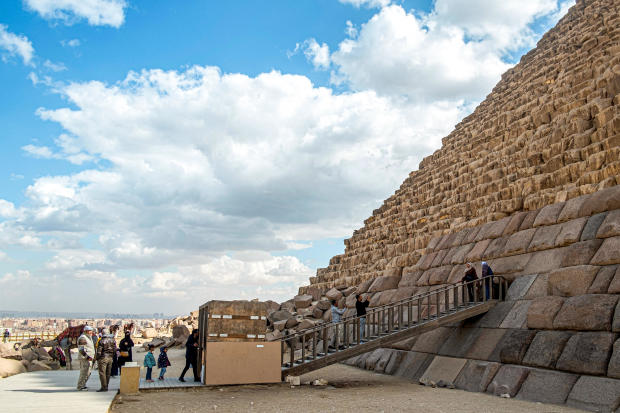
Team planning to rebuild outside of King Menkaure’s pyramid in Egypt told “it’s an impossible project”
Cairo — Just weeks after an Egyptian-Japanese archaeological team announced an ambitious project to reconstruct the outer granite casing of the pyramid of King Menkaure, the smallest of the three main pyramids at Egypt’s iconic Giza Necropolis, a committee appointed to review the plans has declared it “impossible.”
Criticism and fear over the plans for the piece of Egyptian national heritage started to spread online and in the media as soon as the project was announced last month.
The plan had been to dig out and examine dozens of large granite blocks from around the base of the pyramid, with the aim being to eventually reinstall them around the pyramid’s exterior to restore it to what it’s believed to have looked like when it was built more than 4,000 years ago.
KHALED DESOUKI/AFP/Getty
King Menkaure’s pyramid now has between three and eight rows of the granite blocks around its base, but it originally had 16 rows of the blocks rising up the four sides of the structure.
Archaeologists discover tomb of Egyptian royal priest
01:54
“We are talking about saving the third pyramid, Menkaure. We do not need any changes,” Hawass said, adding: “This is one of the Seven Wonders of the World. The project has been discussed by six top Egyptologists, engineers, and architects.”
He said reinstalling the stones would involve the use of modern materials such as cement, which the committee couldn’t back.
“All the international organizations’ rules, such as UNESCO and others, always like to keep the site as it is, without any changes,” Hawass said.
He explained that the committee was open to discussing moving the stones for research and excavation work in the area, assuming a number of conditions were met to preserve the antiquities, but he said even that work was beyond the scope of what the Japanese-Egyptian team could take on.
“In my opinion, I think this is a major, important project, and it will be impossible to do it without an international campaign,” he said. “I think we would need UNESCO to participate.”
The Egyptian-Japanese archaeological team behind the plans did not respond to CBS News’ request for comment on the committee’s decision, and it was not clear if they planned to challenge the ruling with the Ministry of Antiquities in a bid to continue with what they had promised would be “Egypt’s gift to the world in the 21st century.”
Ahmed Shawkat
Source: cbsnews.com